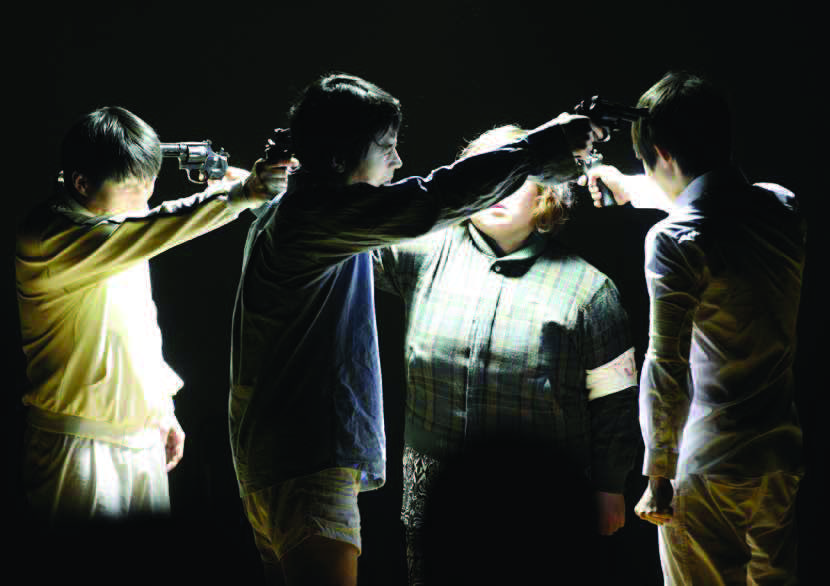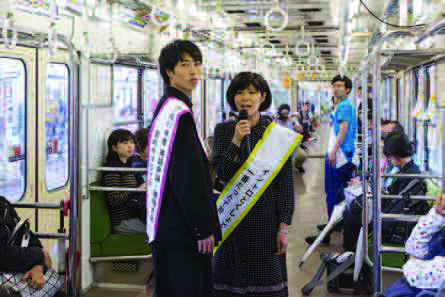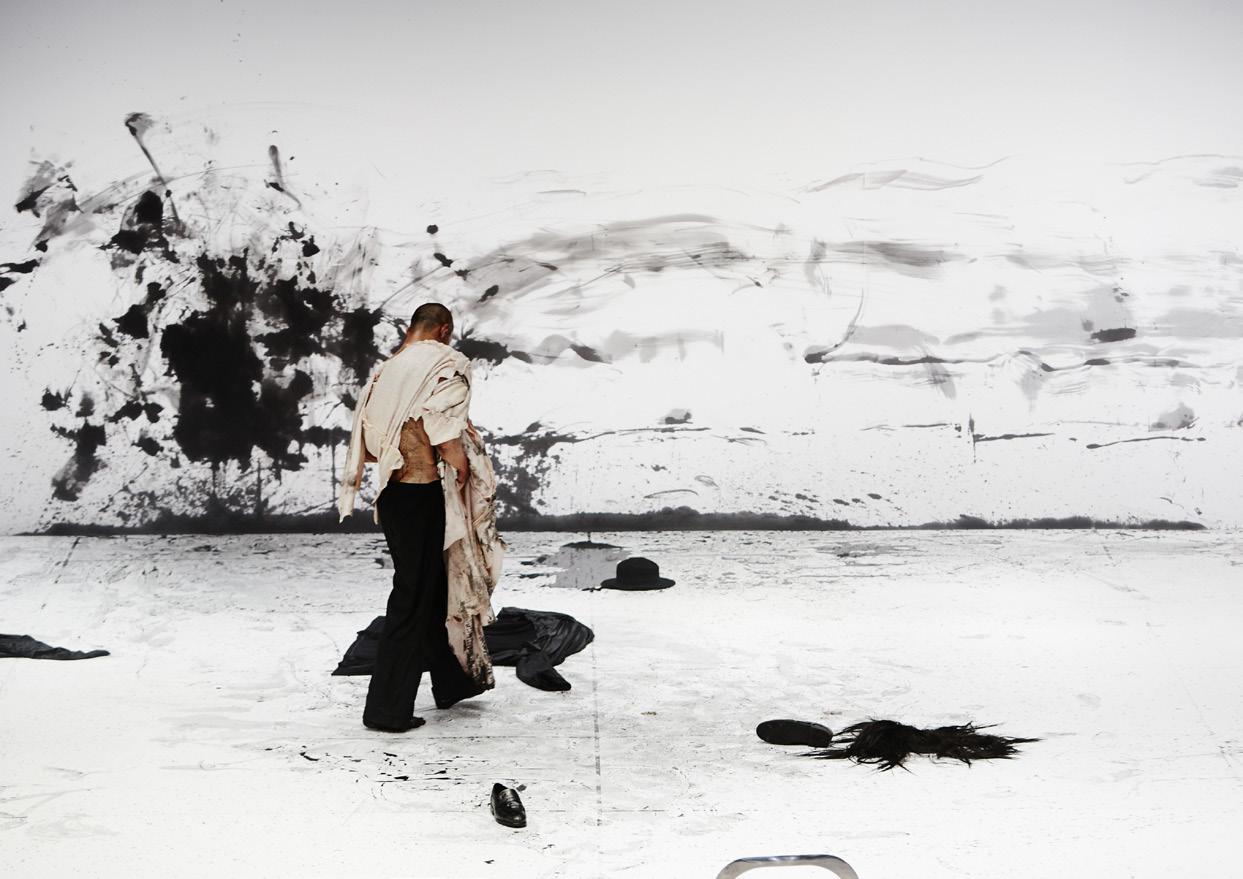Performance Info
YOON Han Sol (Theatre director. Head of theater company Green Pig.)
: Attempting the irreplaceable despite the possibility of failure
Please give us a short description of how you came about to working in theatre and your journey from founding theater company Green Pig to your ten-year anniversary in 2016.
I really wanted to make movies but I couldn’t even find a club to join whilst in university. I joined the theatre club with the absurd goal of making a play and later making the play into a movie and applied for a directing position from the very beginning. After I graduated, I worked as assistant director for big productions such as The Last Empress and Winter Wanderer, and started thinking seriously about the role of the director and entered the graduate program of Columbia University because it was situated in New York and was known for experimental theatre.
It wasn’t an easy time studying abroad and in 2001, in the city that had become so familiar came the September 11th attacks. Experiencing September 11th permanently altered not only me as an artist but my personal life as well. I studied indiscriminately and extensively on subject matters such as war, genocide and terror and started making pieces that dealt with power, hierarchy and violence. If I were to say that before September 11th creating beautiful scenes on stage and texts were a priority, after September 11th I decided that my work would focus on not betraying our society and the perils that our generation is going through. Upon graduation, I founded Green Pig with friends from various international backgrounds and continued producing work in New York with works such as Fifteen Minutes (Cherrylane Theatre, 2003), that was performed at the Edinburgh Fringe Festival in 2002.
After coming back to Korea, I founded Green Pig in Korea along with two of my senior director friends in 2006. My curiosity towards real society topics continued and I continued to study extensively on topics such as the Korean war, migrant workers and nuclear issues and for my first piece in Korea I created i am happy (2007), a piece that was created with researchers on the reality of migrant workers in Korea. The process of creation during this time contributed greatly to the development of the Green Pig creation process. After that, I directed many Korean original plays while consistently working with the theatre company using within a co-creation context.
You have been releasing 2-3 productions a year since 2006 and the spectrum of your work is vast in terms script, co-creation, monologue, the director’s performance and location specific work and outdoor settings. Despite this, is there an aspect you would like the audience to observe in a consistent manner?
The goal of a performance is for its creator to share a unified experience with the audience through action and comprehension and for the creator’s intention to correspond with the understanding of the audience. However, my process as a director begins with breaking the implicit promise of presenting a meaning. Life is complicated, therefor it is impossible to understanding the meaning or there are just too many meanings. I try to delay the presentation or creation of meaning to the very last moment while encouraging the audience to broaden their horizons of interpretation. To be in theatre is an act that constantly strives to be present in the era. That is why I wish to create a space and time in which all of the issues of society, hurtful wounds, questions without solutions and issues that persist yet we don’t wish to think about, can all meet unexpectedly.
The forms of performance also emerge spontaneously through the process of the multi-layered accumulation of the conceptual factors and physical factors of the piece. Said structure is always incomplete and fails to resolve. I try to remind myself to admit to things that are unfinished and things that I do not know. The work exists only within the process. In the end, there is no such thing as finishing a piece. It merely stops at one point.
In that case, if you had to pick one of your work that best represents you, which would that be?
I think I would pick Step Memories-the return of the oppressed (2010). It was a work that took place within the confines of the Korean War and best represents my directing style, the idiosyncratic creation method of Green Pig and was the piece that started to express the acting style that we aim for. It is also the piece that conveys the idea of coexistence and memory that I still hold on to.
The performance addresses the survivors who hold memories of fighting their own people and the society’s isolation around these people. The piece focuses on the discrepancies between the Korean War itself and the documented language on it and the one thing that can be free from that is ‘testimony.’ A testimony is not a monologue but is spoken to an interviewer and is a process of recreating by the interviewee, in the process of interpreting an experience and emotion and environment always becomes involved. Each participant-acting, music, visual effects, art- states a testimony that that involves the individual’s memories and social ramifications and these testimonials fall into place as a floor for conversation is created.
This work has been invited to Festival/Tokyo in 2012 and is scheduled to be performed at the Spielart Festival in Munich in November 2017.
It seems as though you are working on more personal projects as opposed to projects abroad or in conjunction with the theatre company.
Camino de Ansan (2015-) is a very important turning point in my career as it is my very first attempt at an outdoor, movable performance and an artist collective that involves other genres. It is the result of much contemplation on creating a performance that deals with the tragedies that are occurring in this very era. Although it is a confession of a sense of failure and impotence.
Saitama Frontage (2016), which was commissioned by the Saitama Triennale was my first international collaboration. All participants with the exception of the producer and director were Japanese and the participation of the citizens of Saitama played a very important role. The work involved detailed research on the Tokyo suburb city called Saitama and connecting the subway, tracks and platforms that go across the city by using a microscopic approach to observing everyday Saitama.
I would like to hear about any dilemmas regarding your work and future endeavors based on that.
Upon attempting many methods of co-creation, I inadvertently come up with ways to increase my batting average and am tempted to clone myself. It is not easy to find new ways to do things all the while trying to convince a team to let go of the old way of doing
things. Also, while I refuse to commercialize my work, I do feel confused at my own tendency to give into material temptation, all the while using this dichotomy as fuel while I continue to reflect on myself.
Following productions such as the Korean War themed Step Memories and the national security themed Reds, A Study for Rehabilitation (2013), I will continue with ‘The Republic of Korea series,’ which surrounds themes such as Japanese sympathizers, Christianity and real estate. I am also preparing a Korea-Japan summit version of Nation, which is a project that involves audience members of both Japan and Korea electing the leaders of each others’ nations, hoping that this project will expand to a Singapore-Malaysia and China-Taiwan version. I am also conceptualizing a series on death. I want to produce as much material as possible.
* Photo "Step Memories - The return of the oppressed" copyright : 2012 Festival Tokyo
* Photo "Saitama Frontage" copyright : Saitama Triennale2016
Production Details
- Director
Reference
- E-mailyoon_hansol@yahoo.co.kr








.jpg)



 PREV
PREV
.jpeg)
.jpg)
_(c)포스(FORCE).jpg)
_(c)장석현_코끼리들이 웃는다(SUKHYUN JANG_ELEPHANTS LAUGH).jpg)
.jpg)
.jpg)
_(c)한받(Hahn Vad).jpg)
_(c)비주얼씨어터 꽃(CCOT)(1).jpg)
_(c)봉앤줄 (BONGnJOULE)(1).jpg)
_(c)대한민국연극제 2019 (Korea Theater Festival 2019)(0).jpg)
_(c)몸꼴(Momggol)(1).jpg)
.png)
2018MODAFE_Taemin Cho (2).jpg)











